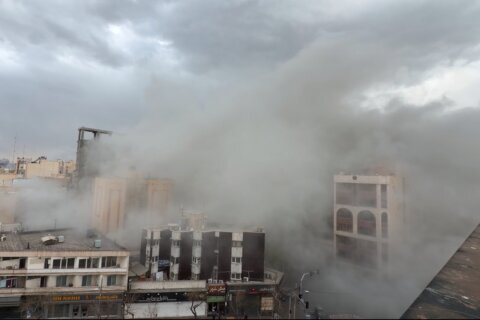WASHINGTON — Yemen’s civil war has ripped the fabric of the historic nation apart since it started in 2015 and it shows no signs of ending. As a coalition led by Saudi Arabia fights on behalf of Yemen’s internationally recognized but deposed government, the human toll grows.
According to the World Health Organization, 62,000 people have been killed and injured. Two million people have been displaced in three years of war. Nearly 2 million children are malnourished; 18 million people don’t have safe, reliable food sources, and 16 million people lack access to safe water.
The Saudi-led coalition is battling Iranian-backed Houthi rebels, but not just for control of Yemen.
“At the same time, the Kingdom is playing defense,” Fatimah Baeshen, spokesperson for the embassy of Saudi Arabia in Washington, told WTOP.
“There have been egregious and threatening acts against the Yemeni people as well as the Kingdom. There have been roughly 95 ballistic missiles shot by Houthi militia from Yemen into the Kingdom of Saudi Arabia. So this is a direct threat that’s right on our borders,” Baeshen said.
But while Saudi Arabia fights to return ousted President Abed Rabbo Mansour Hadi to power, Baeshen said their fight is also for those trapped in the war-torn country.
“At the end of January, the Saudi-led coalition launched the Yemen Comprehensive Humanitarian Operations (YCHO), which are over $3.5 billion worth of aid that’s going to go comprehensively across Yemen impartially, irrespective of what side of conflict that you’re on, to immediately provide relief to the Yemeni people,” Baeshen said.
A part of the reason for the humanitarian effort was a serious cholera outbreak in 2016.
It occurred, Baeshen said, “when the Iranian-backed Houthi militia stopped paying public sector workers because they stole the money from the public coffers of the state.”
Trash piled up in the streets, “and it leaked into the sewers and it allowed cholera spread rapidly. Saudi Arabia stepped in and donated $63 million at the height of the cholera outbreak,” said Baeshen.
Food, fuel and medicine and a second central bank injection to bolster Yemen’s currency (rial) has also been facilitated. There has also been “psychological rehabilitation for child victims of war and recruitment … raising awareness among parents of the risks of forced recruitment of children, and [discussions about] how to create a nurturing environment for underage ex-conscripts,” according a statement from the Saudi embassy.
The Saudi Kingdom, in the interest of those caught in the conflict, has taken “steps to augment humanitarian aid across Yemen that even goes to benefit the Houthi militia,” according to Baeshen.
Saudi Arabia’s critics say the Kingdom has played a role in the destruction of Yemen and climate that has led to the human suffering, but Baeshen, referring to its increasing humanitarian operations said, “If we look at what the Kingdom of Saudi Arabia has done in Yemen, it’s very clear whose side we’re on.”








